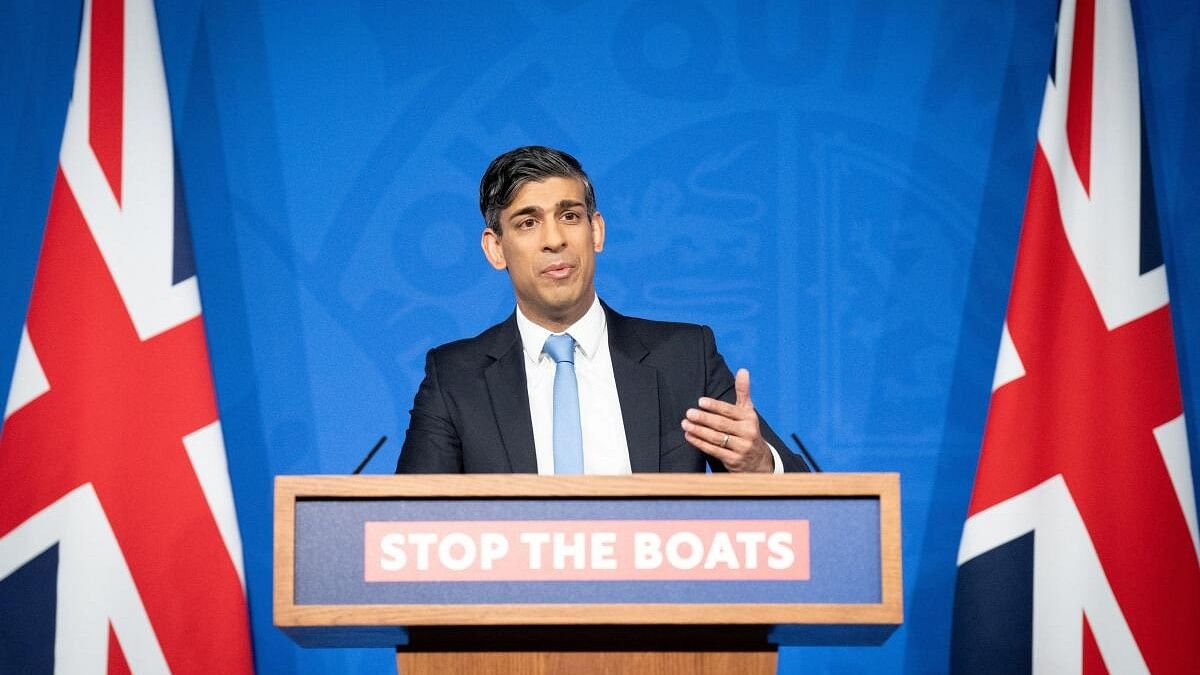
Rishi Sunak speaks during a press conference in Downing Street in London, after he saw the Safety of Rwanda Bill pass its third reading in the House of Commons.
Credit: Reuters File Photo
The contentious Rwanda Bill, passed on April 23, 2024, by the Parliament of the United Kingdom, sailed through without any major hiccups, reflecting the UK’s stance of “Take Back Control’ against the influx of asylum seekers from the Middle Eastern and North African (MENA) region. The controversial bill proposes the deportation of asylum seekers to Rwanda without thorough scrutiny of their claims, a move that has sparked global concern given Rwanda’s reputation as an unsafe destination. UK Prime Minister Rishi Sunak has staunchly supported the bill, vowing “nothing will stand in our way,” as he promises to begin regular flights to the East African country within the next 10–12 weeks. Sunak has further emphasised the success of the bill by calling it a landmark victory in curbing arrivals from non-European countries.
The European region has witnessed visible and evident securitization as it grapples with multiple crises. This shift in bolstering security can be attributed to the 2016 Brexit referendum, where UK citizens voted to exit the European Union, largely in opposition to the influx of refugees fleeing the war zones from countries in the Middle East and Africa.
The UK government has designated Rwanda as a safe country for asylum seekers, formalising this arrangement with the signing of the UK-Rwanda Asylum Partnership Treaty in December 2023. This treaty offers relocation to Rwanda, a country plagued by poverty, in exchange for a £240 million ($304 million) payment from Britain to the Rwandan government. The bill considers Rwanda a safe third country for asylum seekers coming for protection, thereby giving them safe passage to East Africa.
However, the bill has drawn criticism for potentially violating two important international laws. The primary and most important violation concerns non-refoulement under the UN Convention on Refugees, 1951, which prohibits the return of individuals to countries where they face persecution or harm. By potentially sending asylum seekers to Rwanda, a country deemed unsafe by global standards, the bill raises concerns about violating this principle. Without sufficient protection, the entire action raises concerns about the policy of refoulement. Additionally, the bill violates the norm of a ‘safe third country’ of the Asylum Procedures Directive (Article 27), which provides a list of EU-safe countries and asserts that asylum seekers should not face any persecution or harm. However, in practice, this provision is often used by countries to deny protection to asylum seekers and refugees, undermining their rights.
Prime Minister Sunak’s handling of the situation has come under scrutiny and questioned by the opposition party and, most significantly, by the Supreme Court on the ground that the bill violates several laws and norms of both international and regional conventions. This accusation, however, has been deterred by the already-signed UK-Rwanda Asylum Partnership Treaty under clause 2(1), which stipulates, “Every decision-maker must conclusively treat the Republic of Rwanda as safe.” The clause not only picks Rwanda as the “safe destination,” but it also prevents any intervention from anyone who opposes the decision, essentially justifying it against the existing international as well as regional conventions. The Rwanda Bill being passed by the Parliament also gives it an edge over the courts and other judicial bodies as they cannot challenge the protection of a person from “a fair and safe country.”
The contentious bill is a big blow to asylum seekers who are fleeing war and conflict in their home country, as well as legal experts and human rights activists, as the bill, once enacted, gives unconditional power to the government of the United Kingdom to detain them, thereby creating reasons for their passage to Rwanda. This is, however, ironic, as the United Kingdom has spoken against Rwanda previously in 2021, highlighting the “extrajudicial killings, deaths in custody, enforced disappearances, and torture.”
The bill further changes the equation of the already strained relationship of the United Kingdom with the European Union. French President Emmanuel Macron has criticised the Rwanda Bill openly, citing it as a betrayal of the values of the European Union. Experts have also criticised the bill on the grounds of rising Euroscepticism as it might open a Pandora’s box for other member countries of the European Union, a handful of whom are already looking for similar ways with different developing countries for “dumping the asylum seekers.”
However, migration continues in the perilous waterways to Europe, and as the world witnessed five deaths once again, including a seven-year-old, ironically on the day this controversial bill sailed through in UK parliament, one wonders if the bill is just a solution for reneging on refugees.
(The writer is an assistant professor at the Centre for
Research in Social Sciences and Education, Jain (Deemed-to-be University), Bengaluru)